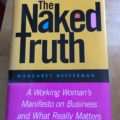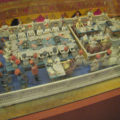“A new Great Awakening is sweeping the country, with Americans increasingly telling pollsters that they believe in prayer and miracles, while only 28 percent say they believe in evolution.” Nicholas Kristof, NYT, Jan 7, 2003
This shouldn’t be surprising, given that, in some parts of America, public schools are required to teach evolution with disclaimers that it is “only a theory,” some giving equal time to creationism. Thankfully, the national curricula for Italy’s public schools are not so wilfully blind, and Italians believe more firmly in the separation of church and state than some Americans do. Rossella’s current history text covers it thus:
“Until the end of the 18th century, it was generally accepted that all existing species had been created by a divine mind, according to a plan which had conceived them already perfectly adapted to their environments. This idea, inspired by the Bible, was known as creationism. … [A] new theory, called evolution, [held that] living species in the course of time undergo very slow but continuous change to adapt to their environments… based on a mechanism of natural selection… Darwinism is a fundamental component of our culture [today]…”
If I were a conspiracy theorist, I would suspect that the American public school system is being made or allowed to become dumber and dumber, so that a nation of sheep will spend their lives on the sofa, happily absorbing entertainment and “news,” with an occasional foray to the mall to spend more money than they should on things the advertisers tell them they need. All this perpetrated, no doubt, by some shadowy elite who can afford to educate their own children at America’s fine private schools and colleges.
Evolution in Italian Schools
May 3, 2004
The recent, much-disputed Moratti Reform of the Italian school system included, among other things, some vague wording that seemed to imply the removal of teaching evolution from the middle-school curriculum. After other issues had been thoroughly dissected and protested, this one excited some heated discussion, and has resulted in a press release clarifying that: “It is absolutely not true that the Ministry has removed the teaching of evolutionary theory from primary and middle schools. The discussion of Darwinian theory, a foundation of modern biological science, is assured for students from 6 to 18 years, according to gradual didactic theories. I wish in this regard to restate that the main objective of the school Reform is to create free consciences, developing a critical sense in students from the first years of their schooling. We wish to assure our children, under the guidance of teachers, a plurality of sources and opinions, so that they can compare and form their own critical consciences. We wish to stimulate all students to think, from the smallest to the oldest, so that they can form a responsible personality based on principles, values, lifestyles, and behaviors [which are] conscious, founded on respect for others, and open to comparison.”
Minister Moratti goes on to say that, given the debate in recent days, a commission has been formed to study the question of evolution and give precise pointers to create a basis for all curricula. This commission is headed by Rita Levi Montalcini (senator for life and Nobel prize winner in medicine), and includes Carlo Rubbia, Nobel for physics, Roberto Colombo, professor of neurobiology and genetics at the Università Cattolica Sacro Cuore di Milano, and Vittorio Sgaramella, professor of molecular biology at the University of Calabria.
Hmm. Minister Moratti is reputed to be of the religious right, though that is a far less heavy affiliation than it would be in the US. Her statement leaves some wiggle room for the introduction of “competing” theories on how life came about, but hopefully a panel of Nobel winners, no matter what their personal theology, will not embarrass themselves and the country by imitating, say, the US state of Georgia.
The press release









